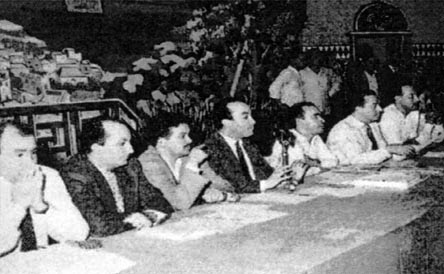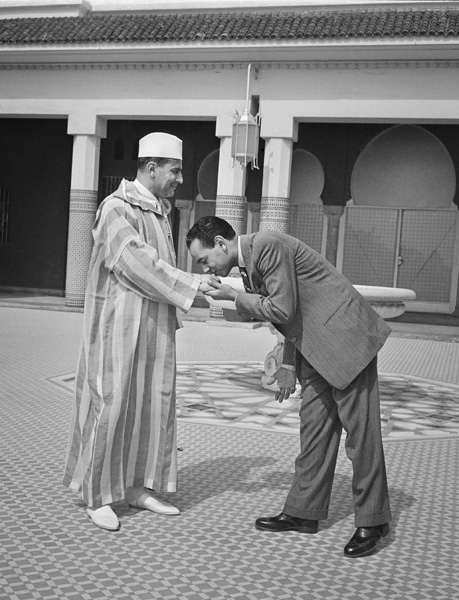|
Moroccan Constitutional Referendum, 1962
A referendum on a new constitution was held in Morocco on 7 December 1962. It was the first national-level vote in the country, and only the second election ever following local elections in 1960. Despite only being announced on 18 November, and facing a boycott campaign from the National Union of Popular Forces (UNFP), voter turnout was 84%, with 97% voting in favour of the new constitution. The first parliamentary elections took place the following year. Results Aftermath In the aftermath of the 1965 Moroccan riots, King Hassan II suspended the constitution and dismissed the parliament, declaring a state of emergency that would last until 1970. References {{Moroccan elections Morocco Referendums in Morocco Constitutional A constitution is the aggregate of fundamental principles or established precedents that constitute the legal basis of a polity, organization or other type of entity, and commonly determines how that entity is to be governed. When these princ ... ... [...More Info...] [...Related Items...] OR: [Wikipedia] [Google] [Baidu] |
Morocco
Morocco, officially the Kingdom of Morocco, is a country in the Maghreb region of North Africa. It has coastlines on the Mediterranean Sea to the north and the Atlantic Ocean to the west, and has land borders with Algeria to Algeria–Morocco border, the east, and the disputed territory of Western Sahara to Morocco–Western Sahara border, the south. Morocco also claims the Spain, Spanish Enclave and exclave, exclaves of Ceuta, Melilla and Peñón de Vélez de la Gomera, and several small Plazas de soberanía, Spanish-controlled islands off its coast. It has a population of approximately 37 million. Islam is both the official and predominant religion, while Arabic and Berber are the official languages. Additionally, French and the Moroccan dialect of Arabic are widely spoken. The culture of Morocco is a mix of Arab culture, Arab, Berbers, Berber, Culture of Africa, African and Culture of Europe, European cultures. Its capital is Rabat, while its largest city is Casablanca. Th ... [...More Info...] [...Related Items...] OR: [Wikipedia] [Google] [Baidu] |
National Union Of Popular Forces
The National Union of Popular Forces (; , UNFP) was a political party in Morocco founded in 1959 in Morocco by Mehdi Ben Barka and others. It opposed the monarchy and it was closely associated with the labour movement, the student movement (particularly the ), and the trade unions. History A group led primarily by Mehdi Ben Barka, Abderrahim Bouabid, , 'Abdallah Ibrahim, Abdullah Ibrahim, and Fqih Basri, al-Faqih al-Basri broke from the Istiqlal Party—which practiced a policy of "consensualism," doing nothing without monarchical consent—and established the National Union of Popular Forces in 1959. John Waterbury described the UNFP membership as the younger members of the old guard of the Istiqlal, including Ben Barka, Bouabid, and Ibrahim, who opposed the older members of the Istiqlal, as well as those who studied in Paris in the 1950s. While the Istiqlal Party became bourgeois, conservative, and closely tied to the monarchy, the UNFP opposed the monarchy and supported Parlia ... [...More Info...] [...Related Items...] OR: [Wikipedia] [Google] [Baidu] |
Dieter Nohlen
Dieter Nohlen (born 6 November 1939) is a German academic and political scientist. He currently holds the position of Emeritus Professor of Political Science in the Faculty of Economic and Social Sciences of the University of Heidelberg. An expert on electoral system An electoral or voting system is a set of rules used to determine the results of an election. Electoral systems are used in politics to elect governments, while non-political elections may take place in business, nonprofit organizations and inf ...s and political development, he has published several books. Bibliography Books published by Nohlen include: *''Electoral systems of the world'' (in German, 1978) *''Lexicon of politics'' (seven volumes) *''Elections and Electoral Systems'' (1996) *''Elections in Africa: A Data Handbook'' (1999 with Michael Krennerich and Bernhard Thibaut) *''Elections in Asia and the Pacific: A Data Handbook'' (2001 with and Christof Hartmann) ** ''Volume 2: South East Asia, East ... [...More Info...] [...Related Items...] OR: [Wikipedia] [Google] [Baidu] |
1963 Moroccan Parliamentary Election
Parliamentary elections were held for the first time in Morocco on 17 May 1963. They followed the approval of a constitution in a referendum the previous year. The result was a victory for the pro-Monarchy Front for the Defence of Constitutional Institutions (FDIC), which won 69 seats. However, the two main opposition parties, the Istiqlal Party and the National Union of Popular Forces, won exactly the same number of seats. Voter turnout was 71.8%. However, in November the Supreme Court annulled the results of several seats won by the opposition. By-elections held in January 1964 gave the FDIC control of Parliament,Ketterer, JFrom one chamber to two: The case of Morocco ''Journal of Legislative Studies'', Spring 2001, vol. 7, no. 1, pp.135-150 which was eventually dissolved by King Hassan II in 1965. Indirect elections to the House of Councillors were held on 12 October, with the FDIC winning 102 of the 120 seats.Dolf Sternberger, Bernhard Vogel, Dieter Nohlen & Klaus Landfried ... [...More Info...] [...Related Items...] OR: [Wikipedia] [Google] [Baidu] |
1965 Moroccan Riots
The 1965 Moroccan riots were street riots in the cities of Morocco, originating in Casablanca in March 1965. They began with a student protest, which expanded to include marginalized members of the population. The number of casualties incurred is contested. Moroccan authorities reported a dozen deaths, whereas the foreign press and the '' Union nationale des forces populaires'' (UNFP) counted more than 1000 deaths.Par Omar Brouksy,Que s'est-il vraiment passé le 23 mars 1965?, ''Jeune Afrique'', 21 March 2005Archived Background Hassan II became King of Morocco upon the death of Mohammed V on February 26, 1961. In December 1962, his appointees drafted a constitution which kept political power in the hands of the monarchy. Hassan II also abandoned the foreign policy of nonalignment and proclaimed hostility towards the newly independent, newly socialist nation of Algeria—resulting in the 1963–1964 "Sand War". The ''Union nationale des forces populaires'', under the leadership ... [...More Info...] [...Related Items...] OR: [Wikipedia] [Google] [Baidu] |
Hassan II Of Morocco
Hassan II (; 9 July 1929 – 23 July 1999) was King of Morocco from 1961 until his death in 1999. A member of the Alawi dynasty, he was the eldest son of King Mohammed V of Morocco, Mohammed V, and his second wife Princess Lalla Abla bint Tahar, Abla bint Tahar. He was named crown prince in 1957 and was the first commander-in-chief of the Royal Moroccan Armed Forces, Royal Armed Forces. He was enthroned as king in 1961 following his father's death. His reign was marked by the start of the Western Sahara conflict and the Sand War, as well as two failed coup attempts against him 1971 Moroccan coup attempt, in 1971 and 1972 Moroccan coup attempt, in 1972. Hassan's conservative approach reportedly strengthened his rule over Morocco and the Western Sahara. He was accused of Authoritarianism, authoritarian practices, as well as human rights and civil rights abuses, particularly during the Years of Lead (Morocco), Years of Lead. A Equity and Reconciliation Commission, truth c ... [...More Info...] [...Related Items...] OR: [Wikipedia] [Google] [Baidu] |
State Of Emergency
A state of emergency is a situation in which a government is empowered to put through policies that it would normally not be permitted to do, for the safety and protection of its citizens. A government can declare such a state before, during, or after a natural disaster, civil unrest, armed conflict, medical pandemic or epidemic or other biosecurity risk. Relationship with international law Under international law, rights and freedoms may be suspended during a state of emergency, depending on the severity of the emergency and a government's policies. Use and viewpoints Democracies use states of emergency to manage a range of situations from extreme weather events to public order situations. dictatorship, Dictatorial regimes often declare a state of emergency that is prolonged indefinitely for the life of the regime, or for extended periods of time so that derogations can be used to override human rights of their citizens usually protected by the International Covenant on Civi ... [...More Info...] [...Related Items...] OR: [Wikipedia] [Google] [Baidu] |
1962 Referendums
Year 196 ( CXCVI) was a leap year starting on Thursday of the Julian calendar. At the time, it was known as the Year of the Consulship of Dexter and Messalla (or, less frequently, year 949 ''Ab urbe condita''). The denomination 196 for this year has been used since the early medieval period, when the Anno Domini calendar era became the prevalent method in Europe for naming years. Events By place Roman Empire * Emperor Septimius Severus attempts to assassinate Clodius Albinus but fails, causing Albinus to retaliate militarily. * Emperor Septimius Severus captures and sacks Byzantium; the city is rebuilt and regains its previous prosperity. * In order to assure the support of the Roman legion in Germany on his march to Rome, Clodius Albinus is declared Augustus by his army while crossing Gaul. * Hadrian's wall in Britain is partially destroyed. China * First year of the Jian'an Era, during the reign of the Xian Emperor of the Han. * The Xian Emperor returns to wa ... [...More Info...] [...Related Items...] OR: [Wikipedia] [Google] [Baidu] |
Referendums In Morocco
A referendum, plebiscite, or ballot measure is a direct vote by the electorate (rather than their representatives) on a proposal, law, or political issue. A referendum may be either binding (resulting in the adoption of a new policy) or advisory (functioning like a large-scale opinion poll). Etymology 'Referendum' is the gerundive form of the Latin verb , literally "to carry back" (from the verb , "to bear, bring, carry" plus the inseparable prefix , here meaning "back"Marchant & Charles, Cassell's Latin Dictionary, 1928, p. 469.). As a gerundive is an adjective,A gerundive is a verbal adjective (Kennedy's Shorter Latin Primer, 1962 edition, p. 91.) not a noun, it cannot be used alone in Latin, and must be contained within a context attached to a noun such as , "A proposal which must be carried back to the people". The addition of the verb (3rd person singular, ) to a gerundive, denotes the idea of necessity or compulsion, that which "must" be done, rather than that which is ... [...More Info...] [...Related Items...] OR: [Wikipedia] [Google] [Baidu] |
1962 In Morocco
Year 196 ( CXCVI) was a leap year starting on Thursday of the Julian calendar. At the time, it was known as the Year of the Consulship of Dexter and Messalla (or, less frequently, year 949 ''Ab urbe condita''). The denomination 196 for this year has been used since the early medieval period, when the Anno Domini calendar era became the prevalent method in Europe for naming years. Events By place Roman Empire * Emperor Septimius Severus attempts to assassinate Clodius Albinus but fails, causing Albinus to retaliate militarily. * Emperor Septimius Severus captures and sacks Byzantium; the city is rebuilt and regains its previous prosperity. * In order to assure the support of the Roman legion in Germany on his march to Rome, Clodius Albinus is declared Augustus by his army while crossing Gaul. * Hadrian's wall in Britain is partially destroyed. China * First year of the Jian'an Era, during the reign of the Xian Emperor of the Han. * The Xian Emperor returns to war-r ... [...More Info...] [...Related Items...] OR: [Wikipedia] [Google] [Baidu] |


